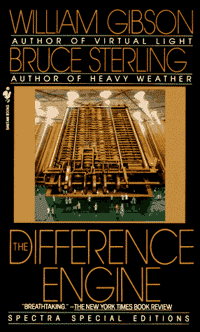Bill: There's the implication sometimes (Warren Ellis used this in Ministry of Space), that the advent of high technology freezes culture in the state it was in when the technology boomed... so his British Space Empire freezes ethics in a racist/classist early-20th-century frame in that book. I can't tell yet if Gibson & Sterling are going for that kind of thing in this book - I don't think we're far enough into the "future" from a steam-era perspective to tell if they are saying anything about how steam-era computation might have affected the cultural landscape that followed.
Allana: You're right; I was expecting (as I mentioned in, I think, one of my Known Issues things) to see a lot more of how people live with technology in daily life. Mostly it's just been half-hearted "oh, those newfangled thingadooders" reactions so far. But, only the first part, so I'll keep my fingers crossed.
Allana: Oh, speaking of Heinlein! I just "read" The Windup Girl, which I know you're working on right now. To be honest, I wasn't really happy with the first few chapters, so I sort of skimmed. And then told someone, "If you want to read The Windup Girl, just read Friday by Robert Heinlein." I like that one of the strongest themes in sci-fi is "people reacting negatively to new technology," even though most sci-fi authors are the types that dream endlessly about new machines to play with. The Windup Girl and Friday both play with the artificial-human-beings theme, giving their not-quite-human protagonists heart and, most importantly, regret and shame about their states of being. Yet the people who make and use those technologies never seem to have any fear or worry.
Bill: Friday is an interesting book to bring up, as one of the technologies that exists in that book is a very comprehensive surgical and health maintenance capability, so the main character, a spy, is in one scene horribly raped and disfigured, but her attitude toward it is to engage in the sex and keep her attackers off balance, as she knows as long as she can stay alive and escape, everything can be repaired physically as though it never happened. It is a profoundly disturbing episode, but it pushes the what-if pretty strongly... what if you could erase all evidence of any physical damage? Could you then bend your mind to better endure the psychological trauma, as you'd know all along that the permanent physical effects were nothing to worry about?
Allana: As opposed to the Windup Girl, who seems to just have enough mind-control training to believe that she deserves her torment. I admit that Friday is probably in my top three books, ever. And I've read it so many times now, the first being when I was probably 15, that what was probably shocking once is now comforting.
Bill: Heinlein was probably one of the more audacious science fiction writers who ever wrote. Especially considering he was writing in the 1950s and 1960s. He really seemed to be able to cross taboo lines at will.
Allana: And it's funny that I don't find the rest of his stuff so compelling. Again with the rough'n'tough female character I can identify with, I guess. And I should probably mention that I willingly volunteer for what many people would assume to be fairly "disturbing" physical injuries.
Bill: Ha! But piercings and body-mods are fairly commonplace now. Still a subculture, and still looked on with surprise by most, but not the circus sideshow horrors that they were once considered.
Allana: Yeah, but watching someone hang from hooks is different from doing it yourself.
This picture of the shadow of a man in suspension linked to from macwagen's Flickr photostream.
Allana: My point is that I somehow found a disposition for the latter, and whether books like Friday correlated or caused it is up for discussion.
Bill: Do you gravitate toward these characters in fiction because of your disposition, or does exposures to these charaters create your disposition? I usually suspect the former over the latter. I don't think fiction changes people, I think it reflects them.
Allana: It is a good question, and one I should table-turn on you. Why the interest in sci-fi, Bill? I just blame my dad. And how do you, as what I assume to be a slightly less self-injurious type, feel when you encounter those scenes? I think most sci-fi fans, when they read about people with what we consider to be superhuman abilities, just wish to be them. And people that get turned off by hearing about encounters where those powers would be necessary just avoid the genre as a whole in the first place. Which makes the whole discussion pretty lopsided. You must be weird and slightly reckless and/or self-destructive in order to want to read these sorts of books at all.
Bill: Yeah, I think the people who read science fiction, especially uncomfortable taboo crossing science fiction as opposed to vanilla space adventures, are the sort who self select for casualness with things like body mods or sometimes risky entertainments.
Allana: ... (This is the part where you relate a little-known and possibly embarrassing secret about yourself, thus ending any future political aspirations.)
Bill: All my current flirting with taboo happens in my head. When I was younger I read mostly fantasy. Tolkein and his degenerate literary heirs. It wasn't until I moved west after college that I really dove into science fiction, and then it was the really hard stuff. Real physics and plausible biology. Logically consistent futures extrapolated out of something I saw in the actual world. Everything I was experiencing at the time was new and kind of amazing in my real life. I had just come through a cross-country trip that wrecked a couple of friendships, and I was as far away from home as I'd ever been. San Diego and Los Angeles are like science fiction when you grew up in a town like the one I grew up in. In the course of that adventure I had my only encounter with mushrooms, which for me at least was not a good trip. I don't want to give that too much emphasis; I was quite imaginatively engaged in the world my whole life. The mushroom experience was just the first time I felt I didn't have control of my own mind, though. You know? If chemicals could do that, then what is your mind? A chemical engine? I think I became a lot more directly interested in the role a brain plays in the experience of self-perception than I had been before that. That was just another seed of interest that found flower in hard science fiction. Fundamentally, though, I think it comes from a desire to just see what comes next. I can't imagine ever being bored. If you could keep me alive a thousand years with my head in a Futurama jar I'd sign up for that, just to know what happens next. I used to tell people if NASA was looking for volunteers to go to Mars, but couldn't bring us back, I'd still go. These days I think I like trees and oxygen too much to permanently give them up, but I still feel the immoliative romance of that adventure. The First Corpse on Mars wouldn't be a bad end. And that's why the interest in sci-fi.
Allana: I guess that's fair enough. And ditto on wanting to be alive for a thousand years!
Bill: I'm sure I'm supressing some colorful memories.
To be concluded in Typogram I.IV - Products of a Card-Programmed Inhuman Loom
Typogram I.III - Watching Someone Hang From Hooks is Different From Doing It Yourself
Written by Bill on Wednesday, April 07, 2010
Subscribe to:
Post Comments (Atom)




That bit I said about technology being depicted as freezing societal structures... I think I need to expand on that a bit: I think my initial thoughts were a bit over simplified.
ReplyDeleteIt's more the case that technology arises out of societal desire, and then gets used. Its use sometimes reinforces the cultural norms that gave birth to it, and sometimes subverts them.
When a technology enables the extension of a culture into places it has not previously been dominant, then it acts to prolong that culture past what might otherwise have been its natural span.
So, in the "Ministry of Space" example I gave, the advent of rockets enables the British Empire to expand to the Moon and Mars, giving a new blush of youth to the Imperial system which would otherwise have died after WWII, its energy depleted.
In "The Difference Engine" I can't yet tell what the advent of mechanical computing has caused. It seems like it might have been more disruptive, as scientific luminaries such as Babbage and Darwin seem to have ascended to ruling political power, sidelining traditional politicians and the Church of England in prominence. Scientific Societies, rather than Social Clubs, seem to be the back-rooms of government.
But there are only hints of this so far, so I'm not sure me read on this is solid yet.
1990 vintage NPR story about The Difference Engine. (OGG format)
ReplyDeletestefan jones - !!! - awesome! Thanks for posting that, it was really fascinating!
ReplyDeleteI was especially interested in hearing how they worked. Fedexing floppies between Austin and Vancouver, using search-and-replace on modern slang using a Victorian slang dictionary... it's a great interview.
I also love how the music they closed with did that hurdy-gurdy Philip Glass thing you suggested earlier. Actually, more Hurdy-gurdy Vangelis, but the feel was what I thought you were going for in that other comment.
Any objections to us making a link to your audio in a top level post after our Typogram I series is done tomorrow?
ReplyDeleteYou can link to that, no problem. I would prefer people download it rather than stream it, though.
ReplyDeleteThe music was a little too jolly for what I had in mind, but it's in the ballpark. Nice cannon shots (?) too.
I found other goodies on the tape, and its neighbor in my cassette morgue:
Digitized but not yet OGGd: NPR news story about Gibson's self-destructing "Agrippa."
Not yet digitized: Gibson reading in NYC from about 20 years ago, introduced by Laurie Anderson.